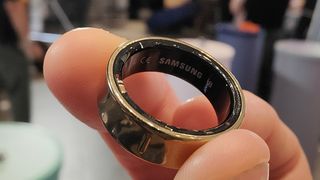This week, I watched the launch trailer for friend – yes, the lower-case is correct here – the latest screenless wearable designed to be interacted with using a microphone and generative AI. The design is simple: you press the button to activate your friend’s microphone, speak your mind, and the friend will use its onboard AI to think up something appropriate to say, sending it to your phone in text format.
Instead of Humane’s attempt to replace the best smartwatches and phones with an AI personal assistant to access emails, messages and information, friend solely focuses on a much more niche use case: companionship.
The trailer was getting comments online that it looked like a Black Mirror episode or an A24 movie, with some justification, and our Editor-At-Large Lance Ulanoff posted his take as soon as it dropped. Simultaneously, my favorite (by which I mean least favorite) moment of the launch trailer was when a teen tells her AI friend that the falafel she is eating is “dank” before spilling it onto her friend’s device – at which point the friend replies “yum.”

It’s easy to mock friend, and dismiss it as either a dystopian Silicon Valley thought experiment or a data-scraping device in service of improving the generative AI that powers it, which can then be used for more profitable means. However, mocking is the easy route: my colleague Becky Scarrott’s piece about OpenAI struggling to keep a lid on people modding and releasing AI girlfriends using ChatGPT shows that the appetite for AI companionship is there for people who want it. friend is an extension of this need: pitched at ordinary people who are lonely and want someone to talk to. At an attractively priced $99, it might see wider adoption than first thought.
The Samsung Galaxy Ring, another screenless piece of smart tech, is very different from the friend, but it also solely focuses on a niche use case: passive health tracking. It uses Galaxy AI to generate an Energy Score, process information about your health activity levels, and offer you basic advice on how to get better sleep. It even supports gesture controls, allowing you to pinch to operate camera shutters and dismiss alarms. There’s no doubt about it: AI has made this first wave of screenless smart technology possible.

I don’t think smart wearables will ever truly replace phones in the way that Humane was envisioning: at least, not as long as the categories remain distinct in meaningful ways. However, screenless wearables are having a moment, which is likely to lead to a full evolution of the category as we find more natural ways of interacting with our technology than swiping up and down with our old-fashioned, sweaty digits.
What’s more likely to happen is that the phone will remain the “nerve center” of our new technological ecosystem, and we’ll begin interacting with it using voices and gestures more frequently and in more sophisticated ways using wearables tailored to individual use cases, leaving us with fewer reasons to use our thumbs.
For example, using AI-powered earbuds to take instructions and record messages via a microphone, transcribed and sent to another phone using AI, was once considered a pipe dream. Now, we have the best smart glasses with built-in cameras and music controls, and it’s easy to imagine using a smart ring to scroll through information on our glasses’ heads-up display using gestures. In fact, we have reason to believe that Apple is working on that very thing right now.
Virtual friends, smart glasses, and small health trackers are just the tip of the iceberg: the future of wearable tech is screenless, discreet, and powered by AI. It’s possible that bar a few dedicated exercise enthusiasts and power users, the Apple Watch may be going the way of the iPod.
You might also like…
Services Marketplace – Listings, Bookings & Reviews
